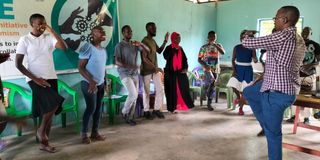Stopping the wheels of radicalization

Youth in Mpeketoni, Lamu County, during a session on countering terrorism. Religious, legal and human rights actors are adopting new strategies to use soft power to counter the threat posed by al-Shabaab in Lamu County.
In a packed hall at Mpeketoni Vocational Training College, dozens of students and young people are being led through counter-terrorism sessions by their tutors.
The participants look anxious, not because the terrorists are about to strike, but because of the topic the trainers are about to take them through.
It is projected on the whiteboard: 'Resilience, Peace and Stability against Radicalisation and Violent Extremism'.
Some of the young people can be seen speaking in low tones.
The subject seems familiar to some of them, while others seem confused.
Are the trainers training these young people to be terrorists or what? There is a sudden silence in the room before one of the facilitators breaks it by introducing the other trainers, who include state officials, especially security and legal experts, to NGOs and the media team.
Religious, legal and human rights actors are adopting new strategies to use soft power to counter the threat posed by al-Shabaab in Lamu County.
For them, the wheels of radicalisation can also be stopped by prevention, not just by fighting those involved.
The groups have decided to tackle extremism at its roots by persuading local youth not to join the terrorist group.
The first such initiative was planned in the town of Mpeketoni, amid a renewed wave of attacks by al-Shabaab militants in parts of the Coast and North Eastern regions.
A lack of jobs has made the majority of Lamu's youth an easy target for recruitment by the militant group.
There's also the use of Islamic jihad to justify terrorist activities and extremism.
An advocacy group, Kiunga Youth Bunge Initiative, started the programme at Mpeketoni, where at least 20 students were trained in countering violent extremism.
Mr Moses Maina, an official, said the outreach programme would be extended to churches and schools.
According to Mr Maina, Lamu has been a hotbed of radicalisation and violent extremism due to its proximity to Somalia.
He said they will also move to Witu, Mokowe, Lamu Island and Kizingitini, where young people will be trained on the same before forming champion clubs to fight terror-related activities in the county.
"Youth in Lamu are vulnerable to radicalisation and violent extremism. That's why we are working hard to build resilience among the youth on such issues," Mr Maina said.
Most of the young people recruited by the terror group, it has emerged, are too desperate to turn down a job offer. They are lured into joining the group under the guise of job opportunities.
Not all those involved in terrorism are from the Coast and North Eastern.
Mpeketoni Law Courts Senior Resident Magistrate Pascal Nabwana, was one of the trainers during the three-day course.
He highlighted the lack of education and meaningful employment as one of the main factors that make youth a target for radical and criminal groups.
Mr Nabwana noted that terrorist groups were keen to maximise on these two gaps in order to mislead communities, especially youth, who are more vulnerable to violent extremism and terrorism.
He explained that terrorism-related offences are serious charges and called on young people to avoid getting involved in them.
"We must stay away from radicalisation and violent extremism. These are crimes that affect the security of society and the entire nation, so they're serious and can cost you your life. Let's be patriotic to our country by engaging in activities that build ourselves and the nation and not otherwise," said Mr Nabwana.
Mpeketoni TVET officer Jackson Kamau said vulnerable youth should be trained in skills that will add value to their academic journey and personal development.
He noted that radicalised youth are involved in many unproductive activities that deprive the country of labour.
Mpeketoni TVET student leaders Fatma Ngala and Keith Kamau said the counter-terrorism sessions would help people of different faiths find common ground on how to fight radicalisation.
"As the first youth champions club formed to fight radicalisation and violent extremism, we will strive to ensure that Mpeketoni TVET emerges as the best in terms of spreading the message of peace and anti-radicalisation to fellow youth and society at large in Lamu," said Ms Ngala.





